
AI Software Development Agents: The Smart Solution for Faster, Better, and Cost-Effective App Creation
January 20, 2025Software development is no longer just about writing code – it’s about building smarter systems that can learn, adapt, and evolve.
Imagine you have an assistant that can guide the whole development process, optimize processes, build apps, and adapt to new challenges as they arise. It’s like having a super-power, being a key player in your industry.
AI software development agents are making this possible by taking over the role of decision-making and intelligent planning. These tools are not just trends—they’re the future of development, as they ensure faster delivery and higher-quality outcomes.
Read our article and find out:
- What are AI software development agents?
- What are its benefits and limitations?
- What are the main AI software development agents types, and how can you see them in business?
Ready? Let’s start the ball rolling!
First, let’s define what we mean by saying “AI agents.”
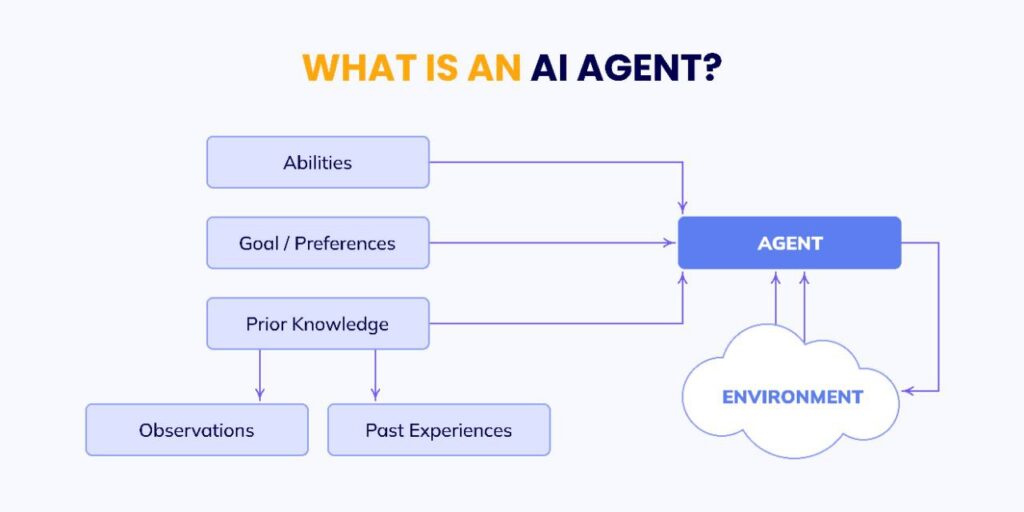
AI agents are smart systems that can make and execute decisions independently. For this purpose, they use technologies like Natural Language Processing (NLP) or Deep Learning to find and follow the best course of action. Research from Deloitte says that half of all enterprises in the world will use AI agents by 2027, so this is a highly promising technology.
To help you clarify the concept, let’s consider chatbots.You probably remember how they work: You ask for something (whether it is writing content, scheduling meetings, or anything else), and the chatbot gets it done. Impressive in its simplicity, does it?
But…even even the best have their flows. While AI chatbots excel at following instructions, they still cannot make decisions on their own. This is something where AI agents truly excel. 
According to IBM, AI agents are “systems or programs that are capable of autonomously performing tasks on behalf of a user or another system by designing its workflow and utilizing available tools.”
F.e., think about booking a flight. An ordinary chatbot gives you information related to the airlines, time of departure, etc. At the same time, an AI agent can compare all options and give you the best options. It could also book the flight for you, handle payments, and provide you with confirmation. This means AI agents can handle tasks from the beginning to the end, all without human intervention.
The big influence of AI agents was even recognized by Demis Hassabis, CEO of DeepMind, “I’m sure you’ve used the various state-of-the-art chatbots today. They’re very passive systems…pretty useful for answering a question…what we want next is more agent-based systems that are able to achieve certain goals or tasks that you give it.”
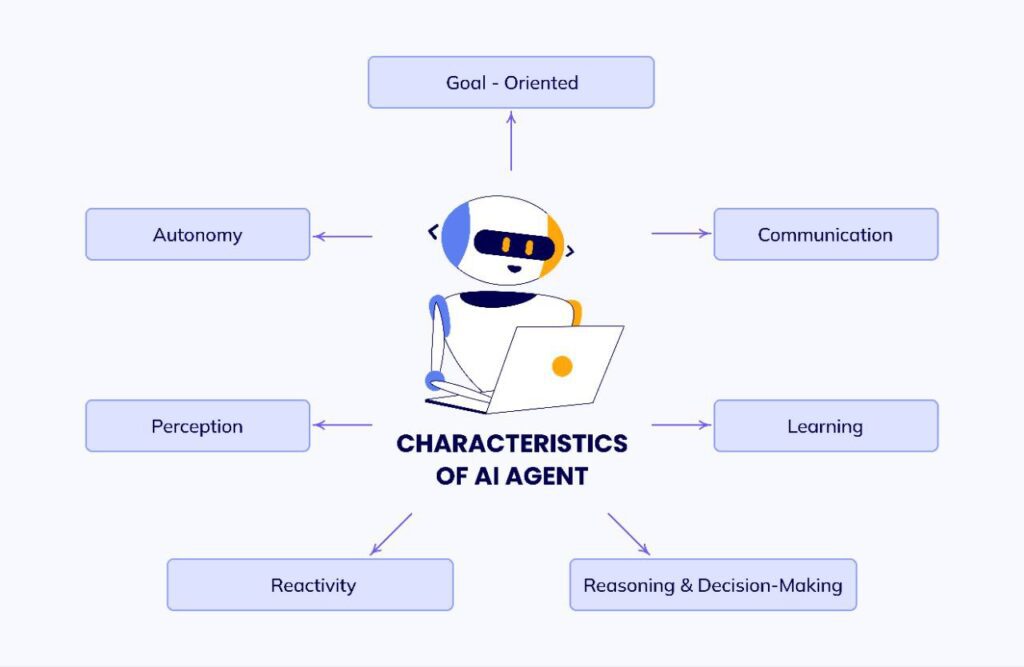
AI software development agents
AI agents can do a lot. However, AI software development agents take it a step further and enhance the whole software development lifecycle. Simply put, they can help you when you can’t hire programmers or want to present your services as soon as possible. Depending on the use case, AI software development agents can benefit from AI agents or large language models (LLM) as their base technology.
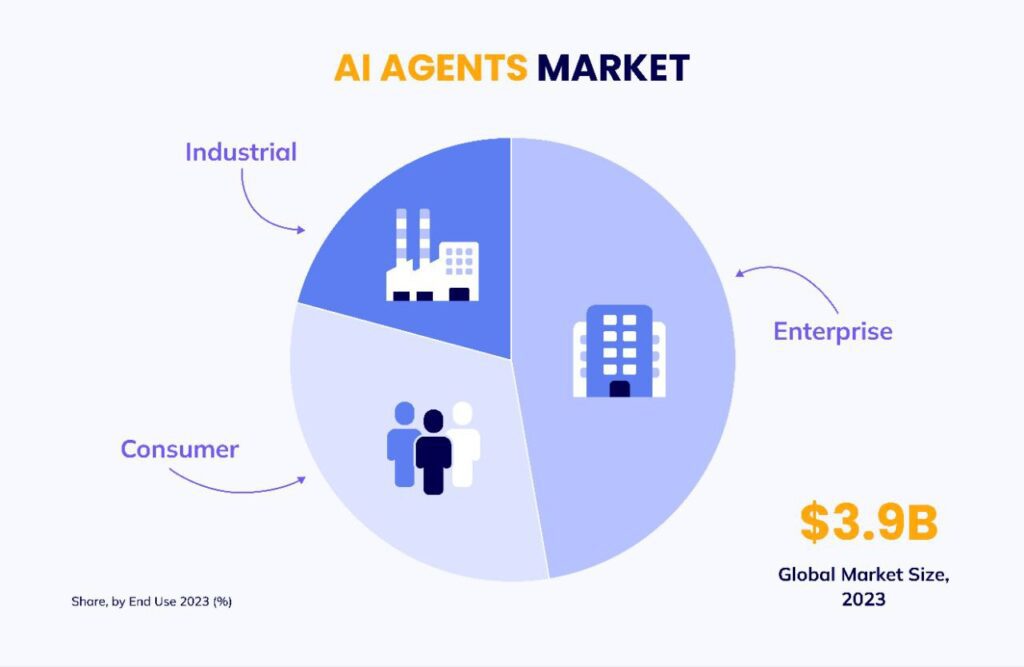
Source: https://www.grandviewresearch.com/industry-analysis/ai-agents-market-report
One notable example of these agents is AI code generators. Tools like Flatlogic, FlutterFlow AI Gen, or Softr.io allow entrepreneurs to create apps in minutes, saving both time and money.
Software development typically follows two main approaches: building fully custom solutions or utilizing SaaS platforms. AI software development agents more closely align with the SaaS approach, providing quick and efficient solutions.
| Aspect | Custom software development | Development with AI software development agent |
| Development approach | Manual coding by developers | AI agents automatically generate code based on user input |
| Time to market | Can take several months to years, depending on complexity | Fast, often minutes to hours for basic prototypes and MVPs |
| Flexibility | Highly flexible; developers can manually adjust the code | Changes can be implemented through prompt updates to the AI model |
| Customization | Highly customizable based on specific business needs and logic | Customization based on initial input |
| Scalability | Requires significant human effort and time to scale systems | Scalable quickly with automated adjustments and reconfigurations |
| Cost | Typically higher due to manual development, long timelines, and resource needs | More cost-effective, as AI tools reduce development time and resources |
| Complexity of projects | Best for highly complex, enterprise-level projects | Best suited for prototypes or MVPs with defined scope |
| Error detection and debugging | Relies on manual testing and debugging by developers | Automated error detection and debugging during the development process |
| Human dependency | High reliance on skilled developers to write, test, and adjust code | Low reliance on human effort; AI generates and adjusts code with minimal human input |
| User input required | Requires detailed and continuous communication with stakeholders | Simple inputs are enough; users specify basic features and requirements |
| Updates | Updates require manual coding and testing for each iteration | AI models can quickly adapt and update the application with minimal human intervention |
| Quality control & iterations | Manual code reviews and testing ensure quality | AI tools like Flatlogic help improve quality by automating testing and debugging |
How do AI software development agents work?
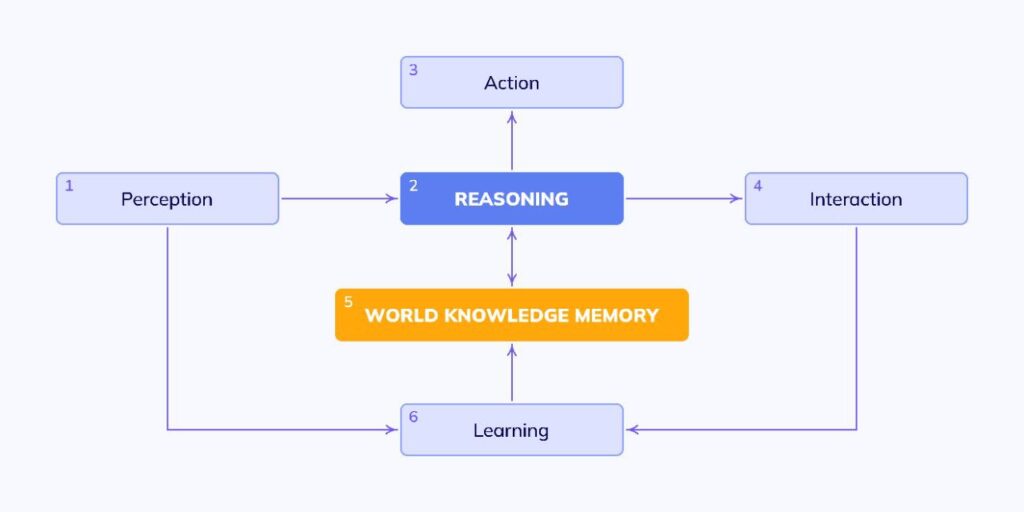
When talking about AI software development agents, it is important to highlight four steps:
- Perception (data collection)
The first thing an AI agent should do is to gather information. This is highly important, as the quality of your data would hardly influence the algorithms and their decisions. In the context of software development, some potential sources of information are codebases, project management tools, developer feedback, and even historical development trends.
Tip for entrepreneurs: Invest in comprehensive data-gathering mechanisms. Integrate multiple tools (e.g., Jira, Git, and Slack) to ensure the AI agent has a holistic view of the development ecosystem.
- Thought and decision-making (problem-solving)
Once an AI agent is fed with data, it should analyze patterns. For instance, an AI agent working on bug detection will assess the code and predict where issues are likely to occur, recommending fixes based on the analysis.
- Action (execution)
In this stage, AI agents do their job. For example, in the case of Flatlogic, the AI software development agent creates full-functional web apps. This includes implementing user interface components, automating processes, etc.
- Learning (continuous improvement)
Once the job is done, AI agents still keep working. They learn from their experience and get better. When they face similar scenarios, they can make stronger decisions by using past experiences.
Understanding of how AI software development agents work can be a game-changer for your business. Dive into the list of the benefits these agents can provide.
What are the benefits of AI software development agents?
Increased efficiency
AI software development agents excel at repetitive tasks (like code generation, debugging, testing, and deployment). This means developers can devote their time to higher-value activities such as designing architecture and implementing complex features.
Building on this capability, AI code generators generate full-functional applications, including backend, frontend, and database layers, with minimal input. These apps come with pre-configured modules such as user authentication, dashboards, and data visualization, which helps to accelerate the process of bringing your app to market.
Interesting fact: Gartner predicts that by 2026, three-quarters of all apps (75%) will be low-code or no-code.
Improved code quality
There is a well-known saying, “Prevention is better than cure.” Interestingly, this also applies to software development. For example, AI agents could offer suggestions and flag potential issues in the programmer’s code. This would streamline bottlenecks in your workflow and be better than reviewing the code after releasing your product.
Interesting fact: According to recent research, finding and fixing bugs early in development is 30 times less expensive than addressing them in production. Stripe’s Developer Coefficient Report
also highlights that the cost of poor code quality for businesses is $85 billion annually.
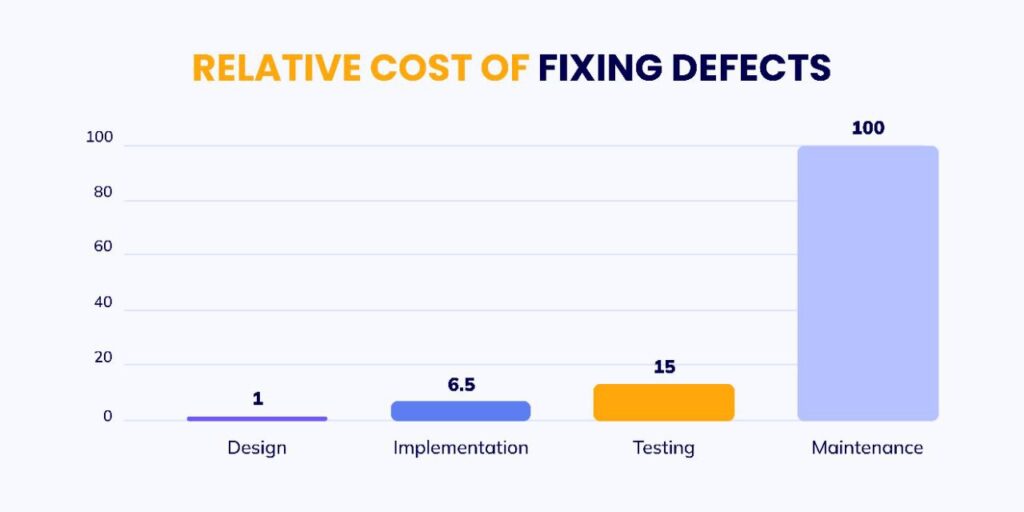
Faster time-to-market
By automating tasks such as generating boilerplate code, running tests, and orchestrating CI/CD pipelines, AI agents significantly reduce development cycles. This accelerated workflow enables businesses to release features or products more quickly, giving them a competitive edge. For example, AI code generators come with built-in deployment tools, which fasten time-to-market to a great extent.
Interesting fact: Harvard Business Review report highlights that companies using AI could release updates 60% faster than their competitors.
Scalability
AI software development agents, including app generators, create scalable solutions to streamline the software development lifecycle. Modern AI agents rely on a modular design, which helps to integrate new capabilities seamlessly.
Interesting fact: Businesses integrating AI scale 2-3 times faster, according to a McKinsey report.
Cost savings
All the benefits mentioned above mean you need less human force to keep your business running and thriving. What is the takeaway here? You need less money. With Flatlogic code generator, you pay only $33$, so you save thousands of dollars.
Interesting fact: According to Forrester, companies utilizing low-code or no-code solutions save up to 40% in development costs.
We’ve covered the “bright sides” of AI software development agents. But how do these benefits translate into practical real-world applications? Let’s see the TOP use cases and how different industries leverage these innovative tools to drive success.
TOP use cases of AI software development agents and applications in industries
Rapid prototyping and MVP development
AI software development agents allow to speed up the time-to-market process and shorten this period to a few minutes (literally!). Only think: what will take your competitors months, will take you only minutes.
Example: Fast time-to-market is especially important in the startup world.
Think about a startup in the healthcare industry that wants to prototype a new patient scheduling app quickly. It has to do it before its competitors, as it’s competing in a crowded market. Here, AI software development agents are your go-to way to generate the framework, basic functionality, and key features that allow you to test the concept with real users almost immediately. It could actually be any industry, not only healthcare.
One illustrative example of how fast time to market is important is the well-known company Spotify. It launched in 2008 and expanded significantly within a few years. By 2015, it was a dominant player in the industry. At the same time, Apple Music launched only in 2015, losing opportunities to win its place in the market. Actually, Apple had more chances to do this, as it already had an existing user base, but it didn’t realize its potential.
Automated code generation
AI software development agents like Flatlogic excel at generating code based only on user requests and simple input.
Example: In the business realm, businesses can develop custom CRM systems. For this purpose, you may just need to describe what you want in a few sentences. What audience are you targeting? What workflows do you desire?
Of course, CRM is not the only end-product you can get with AI software development agents. Some additional applications include:
- Project management tools
- E-commerce platforms
- Inventory management systems
- Custom ERPs
- Analytics and reporting dashboards
- Internal collaboration platforms
- Marketing automation systems
- Supply chain management systems
- Time tracking and billing systems
- Social media management tools
Bug detection and debugging
As it was mentioned above, AI agents can detect potential vulnerabilities in your code and help to improve it. Tools like Flatlogic automatically detect and fix bugs as part of the web app creation process. This enhances both the development cycle and the final product’s quality.
Example: In the financial industry, AI agents can automatically detect common errors (such as mistakes in calculations or data inconsistencies). This helps to identify fraudulent transactions or predict stock market trends.
Additional applications:
- Enhancing cybersecurity by identifying vulnerabilities
- Improving healthcare applications by eliminating errors in data handling
- Ensuring compliance in legal tech applications by validating code logic
To show you how timely bug detection can be relevant, we’d like to talk about GitHub. Automated systems like Dependabot and integrated tools, such as CodeQL, show you vulnerabilities and bugs within the software before they can make it to production.
Flatlogic helps its users in a similar way. Our platform handles both frontend and backend development, including database configurations, based on user inputs. The same applies to other code generation tools like Softr.io or FlutterFlow AI Gen.
Benefit from Flatlogic
Flatlogic’s code generator is a great example of AI software development AI agents. Our unique code generator can create an app in minutes, and it costs only $33.
Our platform is based on a modular, customizable template. It allows you to focus on the core functionalities and due to a rapid prototyping, you can always test ideas and gather user feedback much quicker.
Features of our apps:
- Modular architecture
- Rapid deployment
- Highly customization
- Integration capabilities
- Robust security features
- User-friendly interface
Technical details:
- Both frontend and backend
- Three roles: super-admin, admin, general user
- Backend languages: Node,js, Lavarel
- Frontend languages: React, Angular, Vue
- Database options: MySQL, PostgreSQL
- Cloud-based system
Summing up…
In this article, we’ve explored what AI software development agents are, how they differ from other types of AI agents, as well as how your business can benefit from them.
Why things may look a bit clearer now, we offer to try Flatlogic’s app generator by yourself and see what AI agents can do with your own eyes.
Start your business today with Flatlogic’s code generator and turn your ideas into reality!
